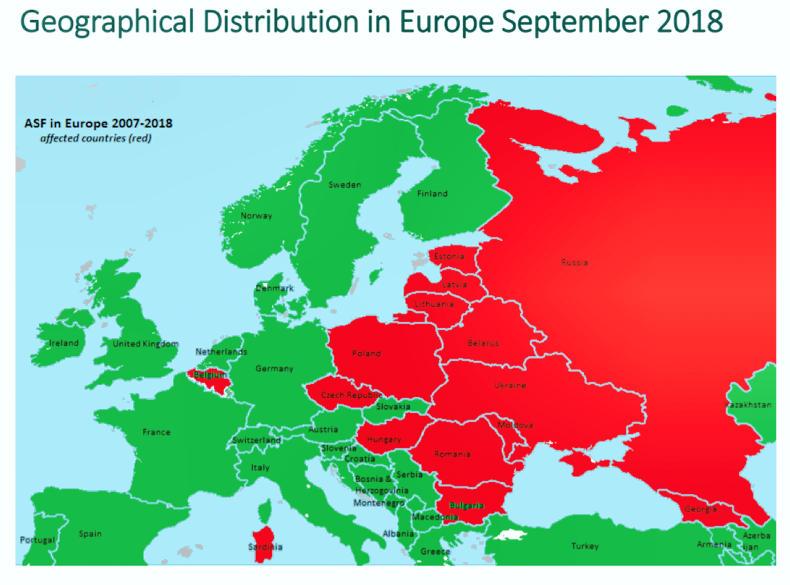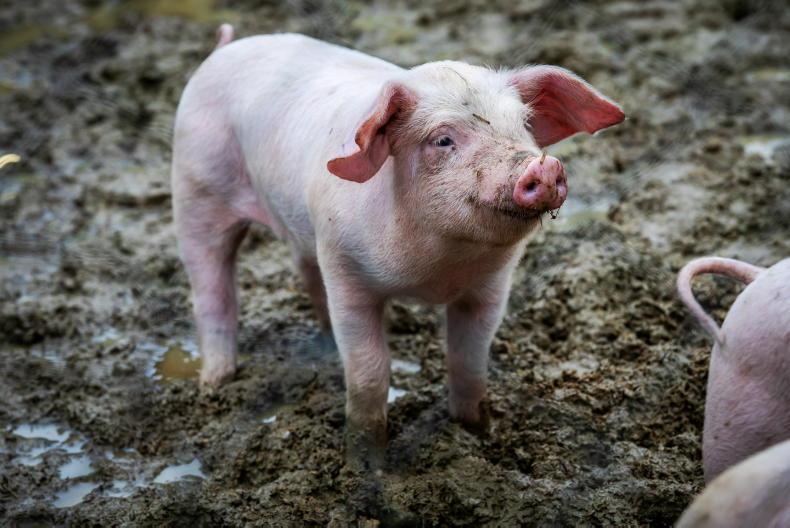The threat of African Swine Fever (ASF) to European and Irish pig production was laid bare at the Irish Pig Health Society’s Annual Symposium last Tuesday.
Veterinary inspector Eithne White highlighted how the incurable virus has already devastated eastern Europe and the Chinese pigmeat industry, with over 1.5 million pigs culled as a result.
In September 2018, Belgium became the first western-European country to report a case of African Swine Fever (ASF).
Belgium hasn’t even had a case of ASF in domestic pigs, only in wild boar. Yet Belgian pork has been banned in 17 countries
In Belgium’s case, ASF has been found exclusively in wild boar, in an isolated woodland region to the south of the country.
“Belgium hasn’t even had a case of ASF in domestic pigs, only in wild boar. Yet Belgian pork has been banned in 17 countries,” she told farmers at the conference.
Should a case of the disease be found in Ireland, White said the Irish pork trade would be “immediately affected” and would take “some time to recover”.
The virus has rampaged through Eastern Europe, mainly as a result of a large wild boar population and poor biosecurity measures. To date there are no known vaccines or cures for the virus.
Czech lockdown
“The only country to successfully eradicate ASF has been the Czech Republic," White noted, with the Czech authorities taking eight months to clear all infected boar.
Using a novel approach, they identified and quarantined the infection zone, which was fenced off and put under strict control.
The area was essentially shut down and hunters were retrained to remove the wild boar population.
Nearly a full year on from their last case of ASF, the Czech Republic is only now due to have export restrictions lifted.

Spread of African Swine Fever. \ Department of Agriculture
Irish concern
While Ireland does not have a wild boar population, there is still reason for concern.
Occasionally there have been unexplained geographical jumps in the disease, as seen in Belgium last year.
The virus could potentially spread to Ireland through vehicles, clothing, farm inputs and animal feed.
Pig farmers can even avail of a free biosecurity assessment from their vet to help lower the risk of disease entering the farm
Working with the National Disease Control Centre, White outlined some of the steps being taken to prevent the spread of Category A diseases to Ireland.
“We have produced posters for the general public, which can be seen in airports and ports. We have also been advising continental transporters, hunters and farmers," she told farmers at the Pig Health Symposium in Portlaoise on Tuesday.
“Pig farmers can even avail of a free biosecurity assessment from their vet to help lower the risk of disease entering the farm,” she added.
Should a case of African Swine Fever be found in Ireland, control measures set out by the EU commission, similar to what was seen in Czech Republic, would be enforced.
Depending on trade agreements, non-EU countries would likely ban Irish pork completely, which would have significant impacts, considering China is Ireland’s second-most important market for pork products.
How is African Swine Fever transmitted?
Contact with infected pigs or wild boar, faeces, urine or bodily fluids. Ingestion of infected pork or pork products by pigs, eg food waste containing salami, sausages etc. Contact with contaminated vehicles, clothing, footwear, equipment.Use of infected reproductive material, eg semen, ova, and embryos.Biological vectors – ticks of the Ornithodoros spp (not present in Ireland).
The threat of African Swine Fever (ASF) to European and Irish pig production was laid bare at the Irish Pig Health Society’s Annual Symposium last Tuesday.
Veterinary inspector Eithne White highlighted how the incurable virus has already devastated eastern Europe and the Chinese pigmeat industry, with over 1.5 million pigs culled as a result.
In September 2018, Belgium became the first western-European country to report a case of African Swine Fever (ASF).
Belgium hasn’t even had a case of ASF in domestic pigs, only in wild boar. Yet Belgian pork has been banned in 17 countries
In Belgium’s case, ASF has been found exclusively in wild boar, in an isolated woodland region to the south of the country.
“Belgium hasn’t even had a case of ASF in domestic pigs, only in wild boar. Yet Belgian pork has been banned in 17 countries,” she told farmers at the conference.
Should a case of the disease be found in Ireland, White said the Irish pork trade would be “immediately affected” and would take “some time to recover”.
The virus has rampaged through Eastern Europe, mainly as a result of a large wild boar population and poor biosecurity measures. To date there are no known vaccines or cures for the virus.
Czech lockdown
“The only country to successfully eradicate ASF has been the Czech Republic," White noted, with the Czech authorities taking eight months to clear all infected boar.
Using a novel approach, they identified and quarantined the infection zone, which was fenced off and put under strict control.
The area was essentially shut down and hunters were retrained to remove the wild boar population.
Nearly a full year on from their last case of ASF, the Czech Republic is only now due to have export restrictions lifted.

Spread of African Swine Fever. \ Department of Agriculture
Irish concern
While Ireland does not have a wild boar population, there is still reason for concern.
Occasionally there have been unexplained geographical jumps in the disease, as seen in Belgium last year.
The virus could potentially spread to Ireland through vehicles, clothing, farm inputs and animal feed.
Pig farmers can even avail of a free biosecurity assessment from their vet to help lower the risk of disease entering the farm
Working with the National Disease Control Centre, White outlined some of the steps being taken to prevent the spread of Category A diseases to Ireland.
“We have produced posters for the general public, which can be seen in airports and ports. We have also been advising continental transporters, hunters and farmers," she told farmers at the Pig Health Symposium in Portlaoise on Tuesday.
“Pig farmers can even avail of a free biosecurity assessment from their vet to help lower the risk of disease entering the farm,” she added.
Should a case of African Swine Fever be found in Ireland, control measures set out by the EU commission, similar to what was seen in Czech Republic, would be enforced.
Depending on trade agreements, non-EU countries would likely ban Irish pork completely, which would have significant impacts, considering China is Ireland’s second-most important market for pork products.
How is African Swine Fever transmitted?
Contact with infected pigs or wild boar, faeces, urine or bodily fluids. Ingestion of infected pork or pork products by pigs, eg food waste containing salami, sausages etc. Contact with contaminated vehicles, clothing, footwear, equipment.Use of infected reproductive material, eg semen, ova, and embryos.Biological vectors – ticks of the Ornithodoros spp (not present in Ireland). 









SHARING OPTIONS